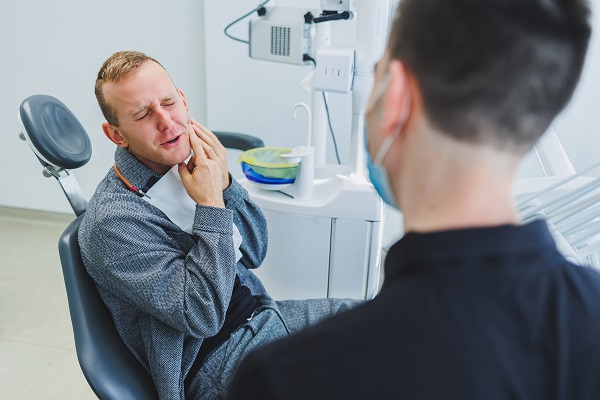5 Signs You Need a TMJ Dentist

A TMJ dentist is a dental professional who focuses on managing and treating the temporomandibular joint disorder. Typically, this type of dentist is one who undergoes general dentistry education and training, but they continue their studies about the temporomandibular joint and how it can negatively impact one's oral health.
TMJ disorder refers to the dysfunction that occurs when the temporomandibular joint (in the jaw) is not in good shape. There may be various reasons why the disorder develops, but typically, it is due to arthritis in the joint, a dislocation of the disc between the ball and joint, or an injury. In some cases, dental issues can also cause TMJ disorder to develop, such as an uneven bite or teeth grinding.
It is important to understand that TMJ disorder can be detrimental to one's oral health. Because of this, it is crucial to see a TMJ dentist as soon as any warning signs or symptoms are detected.
5 Times you may need to see a TMJ dentist
Outlined below are five warning signs that indicate that you may need to see a TMJ dentist. It is a good idea to review these signs in the event that treatment is needed as putting it off can be detrimental to one's health.
1. Pain in the jaw and surrounding area
The most common sign that TMJ disorder is present is a pain in the jaw and surrounding area. The temporomandibular joint connects the jaw to the rest of the skull by acting like a sliding hinge, which is why the jaw is affected. When the sliding joint does not work properly, there is dysfunction and pain. Some individuals note that they experience soreness as opposed to sharp pains. However, either symptom is concerning and should be taken to a TMJ dentist right away.
In addition to the actual jaw pain or discomfort, the surrounding area can also be impacted. There may be pressure throughout the facial area, neck, and even upper back.
2. Discomfort while chewing
One of the key signs that a TMJ dentist says is concerning is when there is discomfort or pain while chewing. Eating is an important part of daily life. Because of this, the mouth needs to function properly. If there is pain or discomfort when chewing food, it may be a warning sign that TMJ disorder is present.
Additionally, TMJ dentists note that if there is pain or discomfort when even opening the mouth an evaluation for TMJ disorder should be done.
3. Jaw clicking or locking
The jaw becomes very impacted when TMJ disorder is present. When the temporomandibular joint experiences dysfunction, the result can be jaw clicking or locking, which is often uncomfortable and bothersome.
4. Dental wear and tear
Although dental issues can cause TMJ disorder, they can also be flipped. For example, TMJ dentists note that a common warning sign of the disorder is when the teeth have extreme wear and tear. The molars may be severely worn down and the surface might even be slightly decayed. TMJ disorder often causes teeth grinding and jaw clenching, unintentionally, which may make the teeth weaker. It is a good idea to keep an eye on the teeth and if there is any sensitivity felt, that might also be a warning sign.
During an evaluation for TMJ disorder, the dentist can look at the teeth to see if any unusual wear and tear is present.
5. Ear pain
Although it may be surprising, when TMJ disorder is present, there might be ear pain. The temporomandibular joint is located very near the auditory canal, which is what feeds through the ears. When the joint malfunctions, the result may be a pain in the ears. In addition, if TMJ disorder is caused by an injury or a blow to the jaw, the ears will also be significantly affected. TMJ dentists note that there is typically a lot of pain and pressure.
Ready to put your TMJ pain behind you?
If and when any of the symptoms or signs that are listed above are noticed, it is a good idea to contact a TMJ dentist right away. The dentist will be able to evaluate the level of dysfunction and determine what type of treatment is necessary. There are a number of ways to address TMJ disorder, including a mouthguard, physical therapy, medications, and even surgical approaches.
To find out more about TMJ disorder or to schedule a consultation, reach out today. We can answer any questions or go over any concerns.
Request an appointment here: https://www.sacramentosleepdentist.com or call Dental Excellence of Greenhaven at (916) 293-0504 for an appointment in our Sacramento office.
Check out what others are saying about our dental services on Google: TMJ Dentist in Sacramento, CA.
Recent Posts
TMJ disorder can be a serious condition and is not something you should ignore. This disorder can affect people of all ages, even those who have good oral health. The effects of TMJ include pain in the jaw that can radiate to other parts of the face. If you do not address these symptoms, you…
A bite guard for TMJ is often necessary when the disorder does not go away on its own, particularly if the condition is caused by nighttime teeth grinding or jaw clenching for other reasons. Individuals who have TMJ symptoms that exist for an extended period of time should consider visiting the dentist to find out…
The temporomandibular joint, commonly called TMJ, is a small joint, which is located in front of your ear where your lower jaw and skull meet. It allows your lower jaw or mandible to move and function. TMJ disorders are common and have a wide range of symptoms. Read on to learn about the early signs…
Patients often confuse TMJ and bruxism, or teeth grinding, with each other. Both are distinct conditions that may actually be related, and both are the cause of discomfort and potentially serious oral health complications.Bruxism is sometimes simply referred to as teeth grinding and typically happens during sleep, but it may occur at any time. Symptoms…


